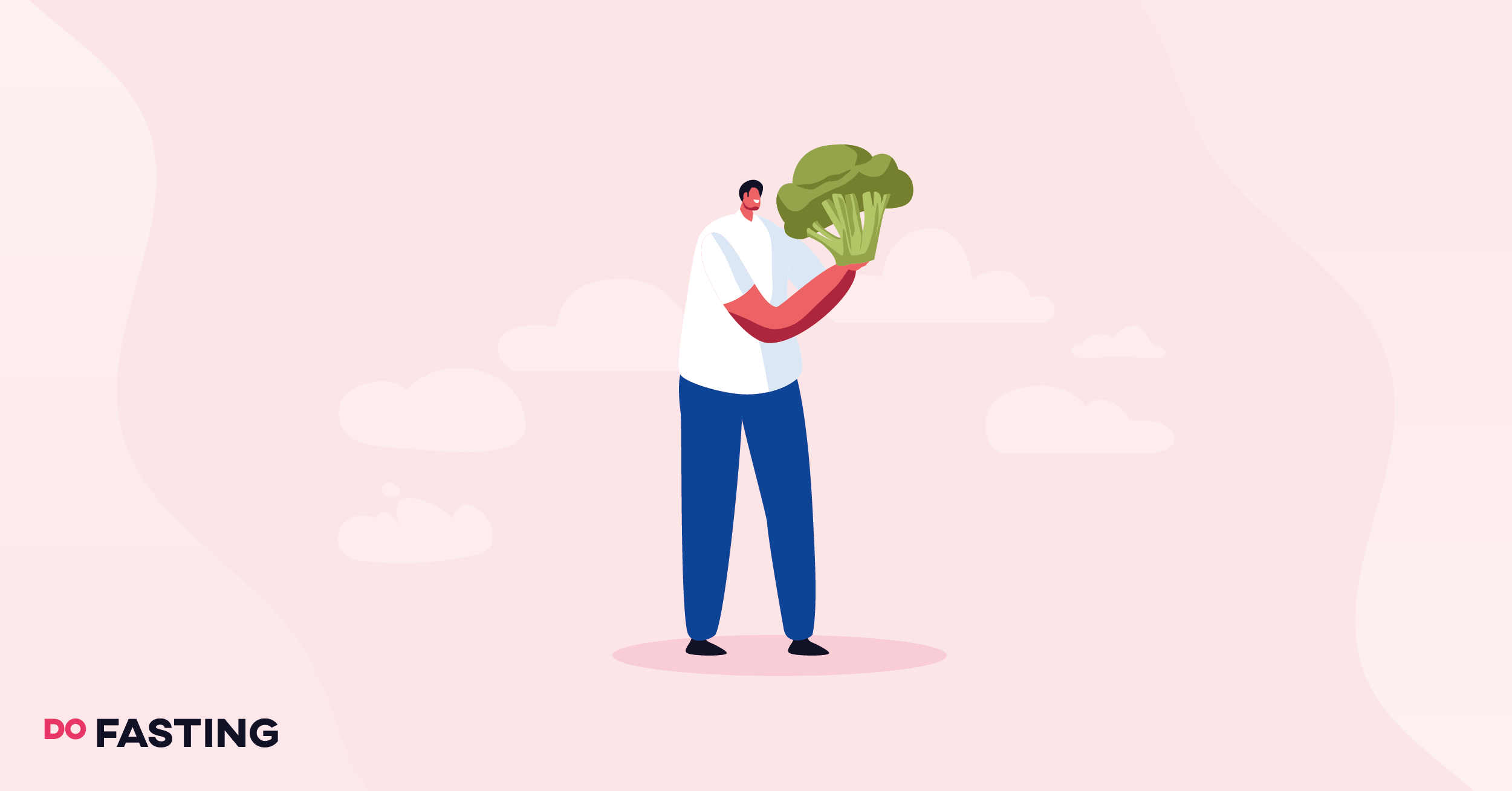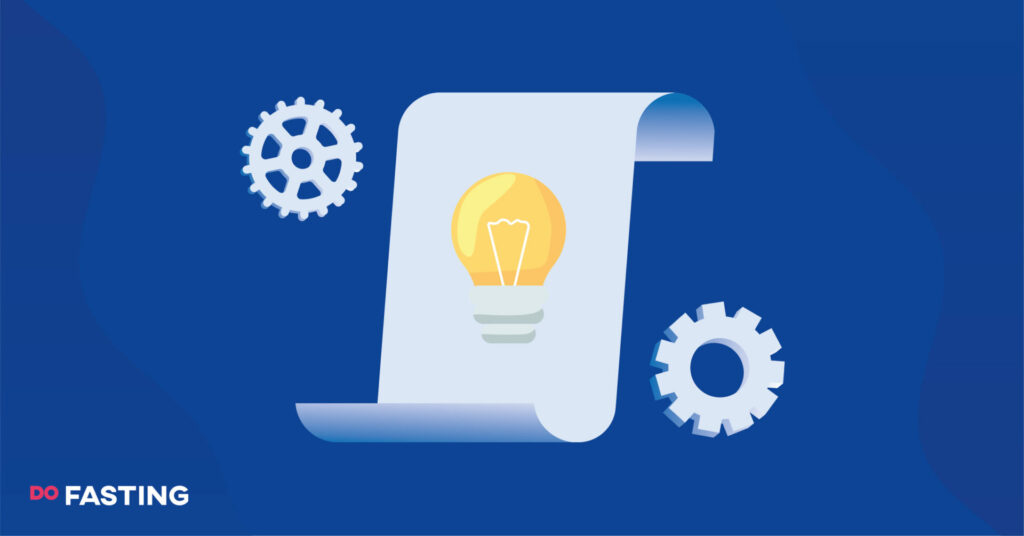Contents
What Is a Vegetarian Intermittent Fasting Diet?
Intermittent fasting is well known for its weight loss results and how many healthy changes occur in your body when you switch to an eating pattern that includes fasting windows.
And these results are only amplified when you eat healthy during your eating window as well— including a vegetarian diet.
With how intermittent fasting works, a vegetarian diet is a great way to manage your calorie intake and pursue a healthy lifestyle while still losing body weight and burning fat stores.
As you burn fat outside of an eating window, you necessarily experience weight loss and a whole host of other benefits, including lower blood pressure and disease prevention.
But it’s more than just skipping breakfast or passing on an early lunch. Intermittent fasting plans for vegetarians include a scheduled-hour eating window where you count calories and a fasting period where ketosis occurs.
To achieve this, there are many types of intermittent fasting that pair well with vegetarianism, including the eat stop eat method or alternate-day fasting.
Vegetarian diets work well with fasting because they are necessarily high in nutrients, thanks to the natural contents of such an eating plan. And paired with intermittent fasting, it primes your metabolism and gives you great fuel to power through and lose weight.
There are six main types of vegetarian diets that you can do while fasting, including:
- Flexitarian— Emphasizes plant-based diet, occasionally including animal products and meat.
- Lacto-Ovo Vegetarian— Includes dairy and eggs, excludes all meat products.
- Lacto-Vegetarian— Includes dairy, excludes all egg and meat products.
- Ovo-Vegetarian— Includes eggs, excludes all dairy and meat products.
- Pescatarian— Includes fish, excludes other meat products. It may include eggs or dairy, depending on preference.
- Vegan— Entirely plant-based diet, excludes all dairy, egg, and meat products.
When following an intermittent fast plan with vegetarianism, you can expect to lose a safe and steady amount of weight as you progress.
This generally occurs at around 1-2 pounds per week, or around 4-8 pounds after a full month. And of course, depending on your body weight and composition, these results can necessarily change.
Take a
1-minute quiz
and discover how much weight you can lose with DoFasting!

What Are the Health Benefits of Combining a Vegetarian Diet and Intermittent Fasting?
The benefits of intermittent fasting are varied, but when paired with a vegetarian diet, the advantages are enhanced— and not just for weight loss! Read on to find out about other wellness benefits that come about during vegetarian fasting.
It May Decrease the Risk of Brain and Heart Diseases
Fasting alone has proven to contribute to heart disease prevention, by lowering blood pressure, reducing cholesterol, and easing oxidative stress within the body.
In addition, fasting can also protect against neurodegeneration and brain diseases like Alzheimer’s, as it regulates neuroinflammation that leads to such dementia illnesses.
As for a vegetarian diet, it’s been shown to significantly decrease instances of cardiovascular issues and heart disease when eating more nutrient-dense plants and far fewer fatty animal products. This also helps lower the likelihood of brain degeneration disorders!
Intermittent Fasting and Vegetarianism Combined Aid With Weight Loss
No matter what, fasting is the best method for weight loss, and a vegetarian diet just increases its efficacy.
That’s because fasting in a calorie deficit pushes your body to flip the metabolic switch into ketosis after several hours of going without food.
And during ketosis, your system begins to target fat cells as fuel instead of burning glucose stored from carbohydrate consumption. This melts body fat for ultimate weight loss and even helps prevent weight gain with a healthier eating pattern.
A Better Life Expectancy Can Be Also Expected
Inflammation in the body is one of the leading causes of many health issues, and if not dealt with, actually can shorten your life expectancy while increasing the risks of chronic inflammatory diseases like cancer.
However, studies show that intermittent fasting vastly reduces inflammation and actively promotes a longer life span for any dieters who follow such eating patterns!
Intermittent Fasting and Vegetarianism Combined Help With Obesity and Diabetes
When it comes to lifestyle diseases such as obesity and diabetes, a veggie fast can be a great way to deal with them.
Fasting and a high-nutrition vegetarian diet work together to lower insulin sensitivity and control blood sugar levels by allowing the body to burn fat and safely release the glycogen stores from the liver, aiding with diabetes and pre-diabetes.
And as fat is burned instead of using sugar for fuel, your body mass index necessarily lowers— a win-win for obesity!
How To Start Intermittent Fasting on a Vegetarian Diet?
Getting started is often the hardest part in any endeavor, but if you keep these tips and tricks in mind, your veggie fast should be easy to begin and maintain for weight loss and wellbeing success!
Clearly Define the Goals You Wish To Achieve When Fasting on a Vegetarian Diet
It is essential to keep your goals results-orientated and rooted in reality. Though you might want to change your lifestyle for the better, it’s not a change that happens overnight!
So, set realistic goals for both your fasting and vegetarianism to prevent feeling discouraged and giving up.
Get an App to Track Your Fasts and Veg Foods
Figuring out the number of whole foods, healthy fats, and even water you are consuming can be confusing, so we recommend downloading a fasting app like DoFasting on your smartphone.
Instead of guesswork in counting calories, use the DoFasting app to log your meals and time fasting or eating periods. It’s especially important to track your nutrients on a vegetarian diet, as getting enough protein, as well as vitamins and minerals, is essential.
Take a
1-minute quiz
and discover how much weight you can lose with DoFasting!

Don’t Be Afraid To Start With a Smaller Fasting Window
Instead of jumping right into a longer fasting period, start small for success.
Try the 14/10 method, 5:2 diet, or alternate-day fasting to get yourself used to the process and prime your metabolism. Then, slowly extend fasting windows once you are completely comfortable.
Remember To Do Only Light Exercises During the Fasting Window
Gaining muscle mass should not be your main focus during fasting, but it is safe to do some exercise in those periods. But keep in mind that because you are in a calorie deficit, your energy levels will not be primed to last through anaerobic activities.
So, instead of weight training or high-intensity workouts, opt for light-intensity aerobic activities like walking, cycling, swimming, or yoga. Make sure you keep yourself hydrated and listen to your body throughout the session.
Plan Your Vegetarian Dishes To Avoid Malnutrition During the Fasting Period
Meal planning is the key to success in any diet, and a veggie fast is no different. It can be especially hard to figure out the calories and nutrients of your vegetarian and fiber-rich meals, particularly when on the go!
So, to avoid missing any nutrition or exceeding calorie limits, make a plan ahead of time and do as much meal prep as possible to make your schedule easy. You will be thankful when it’s finally time to eat!
How To Deal With the Hunger Pangs During the Fasting Window?
Feeling hungry is common in any diet, particularly when fasting for extended periods. But it’s important to not give in to the cravings and break your fast early, as it will cut ketosis short and stop all your optimized fat burning.
Here are some of the best ways to deal with hunger while fasting!
Start a New Hobby To Get Your Mind Off
Taking your mind off the initial discomfort of intermittent fasting is a good way to get through feeling hungry. Instead of thinking about all the food you aren’t eating, get busy with a new hobby that you have always wanted to try.
Consider scrapbooking, going on a nature walk with a friend, picking up macrame, or going to the local library and finding a good book. There are plenty of activities to choose from that will distract you, while not straining your energy levels.
Include More Vegetarian Protein During Your Eating Window
To keep your body fueled through fasting periods, make sure to load up your last meal with enough protein. This will keep you fuller for longer, prime your metabolism towards fat burning, and give you more energy to power through.
It also helps to have a meal plan to balance out the number of vegetarian protein sources, including:
- Amaranth.
- Beans.
- Chia Seeds.
- Edamame.
- Green Peas.
- Hemp Seeds.
- Lentils.
- Quinoa.
- Nutritional Yeast.
- Nuts and Nut Butters.
- Seitan.
- Soy Milk.
- Spelt.
- Spirulina.
- Teff.
- Tempeh.
- Tofu.
Try Using Supplements During Your Fasting Window
It’s a great idea to supplement your nutrients during fasting. And the DoFasting Essential Fiber Complex not only keeps you feeling energized and healthy, but also suppresses your appetite.
With natural glucomannan and cellulose, these supplements are a fantastic choice to suppress cravings and keep your stomach feeling full. And that makes the fasting length easier than ever to get through!
What Can You Have On a Vegetarian Diet When Breaking the Fast?
As you come out of a fasting window, it’s important to eat the right foods at the right times.
Some of the best things to break your fast include the following, which are easy to digest and won’t strain your body. Instead, these foods will give enough protein and light carbohydrates to reintroduce your digestive system to solids without making you ill:
- Apples.
- Avocado.
- Beans.
- Berries.
- Eggs.
- Hummus.
- Nuts.
- Smoothies.
- Starchy Vegetables.
- Sweet Potatoes.
- Tofu.
Avoid processed items like junk food or high-sugar products, and even high-fiber foods like broccoli and kale. These will not only make your blood sugar levels spike, but also leave you feeling sick and too full due to their richness after a prolonged caloric deficit.
Vegetarian Meal Recipe Ideas To Have During Intermittent Fasting
As previously mentioned, meal planning for any feeding window is essential for your fasting success, no matter what diet you follow. That being said, the following are some great whole foods recipes for meals that will still help you lose weight and feel fantastic!
3 Breakfast Meal Ideas
Start your day off right with such options as:
- Greek Yogurt With Raspberries and Blueberries.
- Overnight Chia Seeds With Pistachio Nuts.
- Apple Cinnamon French Toast.
3 Lunch Meal Ideas
Refuel midday by whipping up any of these delights:
- Chickpea Pancake.
- Cheese and Tomato Muffins.
- Avocado Toast With Crispy Chickpeas.
3 Dinner Meal Ideas
And finish the day with a delectable meal, including:
- Kale Casserole With Eggs and Mozzarella.
- Broccoli and Feta Balls.
- Buckwheat With Feta and Vegetables.
Should Everyone Do Intermittent Fasting and Vegetarian Diet Combination?
Intermittent fasting in conjunction with a vegetarian diet does lead to healthier eating habits and many benefits, but there are some individuals for whom fasting is not safe without medical advice or supervision. These groups include the following:
- A current eating disorder or a history of eating disorders.
- Below the age of 18.
- Diabetics.
- Insomniacs.
- Pregnant or breastfeeding.
- Pre-existing medical conditions.
- Taking prescription medications.
Take a
1-minute quiz
and discover how much weight you can lose with DoFasting!

Conclusion
Fasting has some incredible benefits for many people, including weight loss and better eating patterns. And when you add a vegetarian diet to the mix, the benefits only increase.
Whether you are alternate-day fasting or using the eat stop eat method, you can lower blood pressure levels, prevent brain disease, and even increase your longevity by a vegetarian fasting lifestyle. And though the diet isn’t easy, most practitioners agree that the benefits are worth it!
See how DoFasting will improve your life
Find out what works for you with this 60-sec quiz approved by our experts and get your personal revolutionary fasting assistant.
Start the Quiz
This is an evidence-based article that includes scientific citations. DoFasting’s professional writers and editors prepared the content, which a team of medical experts verified to be accurate.















